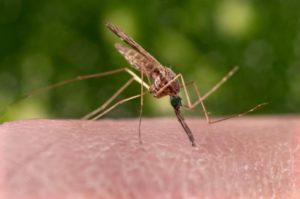
Anopheles sinensis mosquito obtaining blood meal (Public Health Image Library, NIAID, Image ID:18764)
Malaria is still a global health concern due to the high morbidity and mortality caused by malaria parasite infection. The parasite is transmitted through the Anopheles mosquito which acquires malaria parasites when it takes a blood meal from an infected person. The mosquito will then pass on the parasites to an uninfected individual when another blood meal is taken. Understanding the mechanisms that drive transmission of malaria is important to find ways to stop the spread of the disease.
Previous studies have found various microbes that are able to reduce the chances of mosquitoes getting malaria parasites. The mechanisms behind this include bacterial stimulation resulting in the mosquito’s immune system fighting the parasite. Researchers at Johns Hopkins Bloomberg School of Public Health have now found a mosquito mid gut-associated fungus known as Penicillium chrysogenum which increases the chances of a mosquito acquiring malaria parasites after a blood meal, without affecting the survival of the mosquito.
Pe.chrysogenum acts by upregulating the ornithine decarboxylase gene which in turn sequesters arginine for the biosynthesis of polyamines. This results in the reduction of anti-parasitic nitric oxide needed to fight the infection. Arginine is important in the immune response of mosquitoes and therefore without it functioning in the right way they are left susceptible to infection.
Knowledge of Pe.chrysogenum, which increases the chances of a mosquito acquiring malaria, is important in understanding the transmission of the parasite. The fungus does not decrease the survival of the mosquitoes and therefore the main implications are that it increases the transmission of the parasite to humans.
Article by Thandeka Moyo











